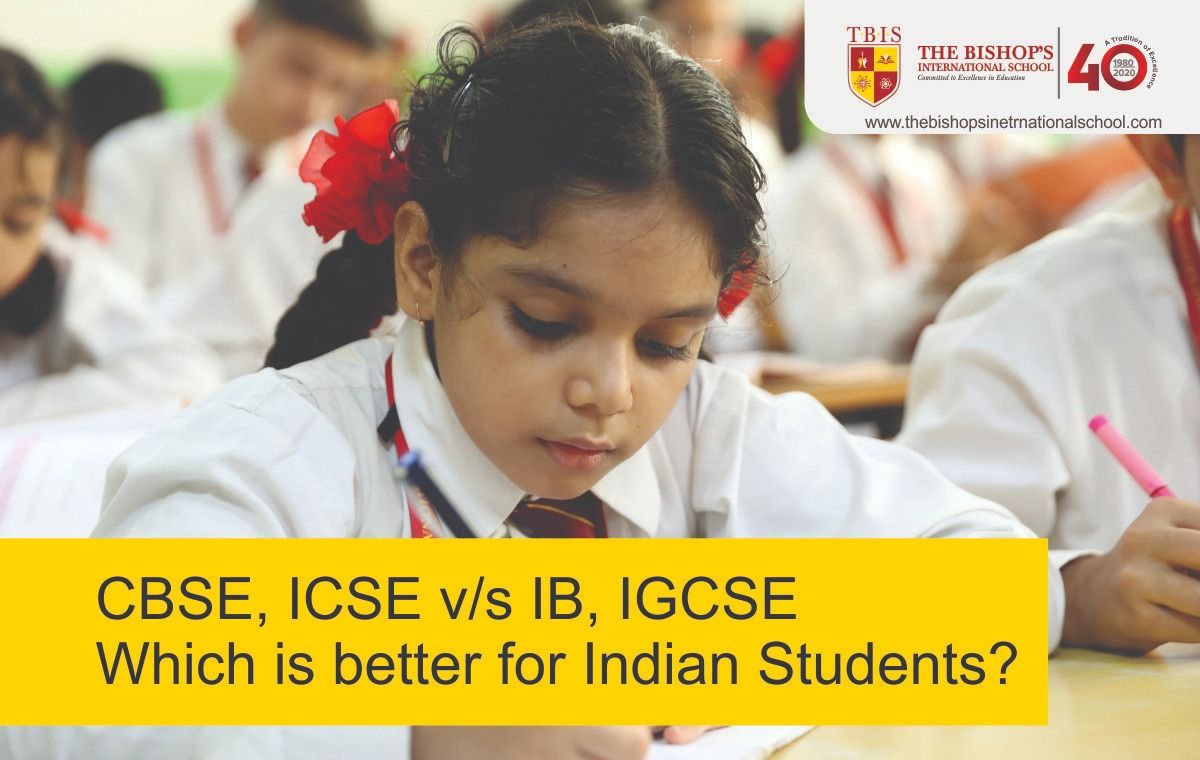
CBSE, ICSE vs. IB, IGCSE, which is better for Indian students?
if your child has more diverse interests, such as art and music, rather than simple fundamentals and, of course, the affordability factor. The following are some of the most crucial aspects of ...
Students nowadays have various curriculum options to choose from, and confusion tends to grow at twice the rate as the number of options increases. Choosing which curriculum is best for the child can be a difficult and time-consuming process. Picking a curriculum is influenced by several factors, including your and your child's goals. This includes sending your child to a prestigious college if you have a job that requires you to relocate within India or globally. And if your child has more diverse interests, such as art and music, rather than simple fundamentals and, of course, the affordability factor. The following are some of the most crucial aspects of each curriculum.
Highlighting curriculum
All of the boards revise their curriculum regularly, with applications, critical thinking, new age learnings, communications, sports education, and so on being the primary focus areas for all of them. However, there are subtle differences that distinguish each board, and they are mentioned below.
Central Board for Secondary Education (CBSE)
The (CBSE) Central Board of Secondary Education was founded in 1962 and reports directly to the Union Government of India. While there are numerous educational boards in India, CBSE is the most popular and has the most students enrolled. Even though the Union Government of India administers this educational board, it has branches worldwide. According to the official website, over 228 diverse CBSE schools outside of India are spread across 25 different countries.
Objective:
CBSE has always worked intending to provide its students with a stress-free education by implementing innovative teaching methods infused with psychological and instructive principles.
Main focus:
While most people in India choose CBSE schools because they want to follow the popular trend, few people are aware that CBSE focuses its curriculum on the most important subjects needed to prepare for entrance exams in engineering and medicine. In a nutshell, CBSE takes a traditional and theoretical approach to subjects such as science and maths, frequently combined with application knowledge of these subjects. The most important aspect of CBSE is that they are better organized, and their simple way of doing things is suitable for most students.
Classes that can apply:
CBSE classes are available from nursery to 12th grade, and students between the ages of 4 and 17 can be admitted to any CBSE school worldwide.
Examinations:
Currently, CBSE conducts two examinations around the world that are for class 10th and class 12th. The grades earned in these classes are valued by both private and public colleges, universities, and other institutions.
Level of complexity:
Because CBSE is relatively simple, a large number of students enrol in CBSE schools.
Pros
- CBSE is accepted by almost every university and college in the world, including India.
- It is simple to transfer from one CBSE school to another.
- A large number of educational institutions
- Education and high-quality content
- It also encompasses the preparatory school curriculum.
- Following the completion of the tenth class, students are required to choose a stream.
- Each student is evaluated consistently and qualitatively.
Indian Certificate for Secondary Education (ICSE)
ICSE and CICSE are the same things, and unlike CBSE, ICSE/CICSE is a privately governed education board in India. It is a national organization comprised of two examination boards, the ICSE for class ten and the ISC for class twelve. CICSE was established in 1952 to replace the Cambridge school of certification examinations. ICSE is not as well-known as CBSE in terms of popularity, but several schools use the ICSE curriculum. The ICSE board uses textbooks of their choice rather than the NCERT pattern. It does not permit private or non-affiliated candidates to take the exams.
Objective:
The primary goal of ICSE is to provide high-quality education to students through a hands-on approach. It encourages students to choose from various streams and subjects for Class 12 by emphasizing science, arts, and language subjects, particularly English.
Main focus:
The ICSE curriculum is considered to be more comprehensive than the CBSE curriculum. This board places equal emphasis on all subjects, including science, arts, math, language, home science, and so on. While this may not be important to most students, students who want to pursue various interests such as arts, language, home science, and so on would benefit from ICSE. ICSE has a comparatively large and diverse range of options in the arts, home science, language, and other fields. According to some experts, ICSE has a balanced curriculum that does not focus on just a few subjects but rather on almost every subject based on the field, including practical and theoretical sides. Aside from that, students who want to study abroad may prefer ICSE over CBSE.
Classes that can apply:
The classes applicable for both CBSE and ICSE are the same. From nursery to 12th grade, ICSE classes are available.
Examinations:
The ICSE or CICSE administers two exams: the ICSE for class 10th and the ISC for class 12th. The marks obtained in the ICSE exams in both the 10th and 12th grades are accepted in almost all colleges and universities in India and abroad. Students who have attended an ICSE school may find it easier to adhere to the syllabus and curriculum of universities and schools abroad.
Level of complexity:
The ICSE syllabus and curriculum are complex, which is where both CBSE and ICSE differ. While a student may score 90 percent in CBSE exams, they may only be able to score 85 percent in ICSE exams. This is one of the major idealogy that many students enrol in CBSE schools have emerged.
Pros
- All fields are given equal attention.
- Students in the arts, home science, language and science have a wide range of options.
- More emphasis on the analytical and practical aspects of each field
- Languages, science, and the arts are all given equal weight, and students are encouraged to choose their favourite subject in class XII.
International Baccalaureate (IB)
The International Baccalaureate (IB) was founded in 1968 in Switzerland and is widely regarded as one of the world's most expensive and prestigious secondary education boards. According to the official website, the IB board of education is present in over 150 countries. In terms of acceptability, IB education is accepted by the majority of universities and schools. This is a new educational structure in India that does not correspond to the local entrance exam structure that is currently in place. This costs more than CBSE.
Objective:
It emphasizes analytical abilities, language, arts, and humanities. The IB's objective is to produce global citizens.
Focus:
IB is popular all over the world, and it typically has three sections. The first for students in Kindergarten to the fifth grade, the second for students in sixth to tenth grade, and the third for students in eleventh to twelfth grade. The main distinction between other educational boards and IB is that, while IB does prescribe a specific set of textbooks, it allows for maximum flexibility in learning. IB is typically more inclined to promote language studies and humanities. Under IB, students are assigned a large amount of work. For example, only a few books are provided to the student, which may not cover the entire syllabus. The student must conduct research and exploration to learn more about the subjects. This type of education is said to provide students with more skills and knowledge.
Classes that can apply:
As previously stated, IB applies to classes ranging from Kindergarten to 12th grade.
Examination:
IB, like CBSE and ICSE, holds final board exams in 10th and 12th grades. Both the 10th and 12th final exam results are valued in India and abroad.
Level of complexity:
When it comes to complexity, IB is at the top of the list. While most people believe that IB is easier than CBSE and ICSE, this is not the case. IB is more difficult than these two because it requires more problem-solving, assignments, quizzes, etc.
Pros
- Globally recognized
- It is simple to enrol in international schools and colleges.
- The curriculum and syllabus are more focused on personal research and application.
- IB is ideal for students who intend to study in any Western country.
- Outstanding infrastructure in schools.
- Almost all international and national technical education boards, as well as other organizations, recognize the IB.
- The board uses an integrated approach in which subjects are not taught in large pieces.
International General Certificate of Secondary Education (IGCSE)
IGCSE is a well-known academic board of education, and as such, it is a globally recognized board of education. While there are only a few IGCSE schools in India, they have a very well-balanced curriculum. Unlike CBSE and ICSE, IGCSE is regarded as a Cambridge O level equivalent and a UK GCSE board. This is one of the reasons why students who complete their IGCSE education will find it easy to gain admission to universities and colleges in other countries. IGCSE, like IB, is an expensive and difficult programme in which finding private tutors who can help students is extremely difficult. As a result, those looking to obtain an international curriculum and global recognition should consider this option.
Objective:
The IGCSE curriculum provides a variety of paths for students of various abilities, including those whose first language is not English.
Main focus:
The entire curriculum and syllabus of IGCSE differ from those of CBSE and ICSE. IGCSE is more precise in balancing, and they have over 70 different disciplines and over 30 different languages to choose from. Unlike the CBSE and ICSE, the IGCSE emphasizes practical approaches to learning and teaching. Since its inception, IGCSE has emphasized providing education based on the student's specific abilities rather than generalizing education. Suppose you want to migrate to other countries and follow their curriculum. In that case, IGCSE may be an option for you because their method of teaching, curriculum, and syllabus is nearly identical to that of the United States and the United Kingdom.
Classification:
Unlike CBSE and ICSE, IGCSE classes are only available for 9th and 10th grades, which is the main distinction between IGCSE and all other boards of education.
Examination:
In terms of exams, the IGCSE board of education differs. While other boards of education only administer written exams, IGCSE administers written, oral, and video tests. Even though IGCSE is only for 9th and 10th grades, a final exam is held in May or November each year.
Level of complexity:
IGCSE is difficult in terms of complexity. While the written exam alone is difficult for ICSE, the written, oral, and video tests for IGCSE add to the difficulty. If the student is unfamiliar with the subjects, they may struggle to pass the final exam.
Pros
- Accepted throughout the world
- Languages and technical subjects receive more attention.
- The syllabus is more balanced in comparison.
- Students can select from a wide range of subjects.
- Best for students who intend to study abroad in another country
Which board is right to select from?
We have listed all of the important facts and benefits above. If you carefully read them, you will notice the major differences between each course. While CBSE is widely regarded as the best in India in terms of popularity, availability, and consistency, ICSE may be the best syllabus and curriculum. When it comes to moving abroad or studying in the fields of arts, home science, language, humanities, and so on, IGCSE and IB may be the best options. But keep in mind that just looking at a board is not enough, but you also need to find out if the fees are reasonable and seats available. When it comes to IGCSE and IB, the number of seats available may be very limited.
Wrapping it up
Each child is distinct. Furthermore, each school is distinct. The environment is also important. As a result, a student's performance in a particular field cannot be solely determined by the board's curriculum. Choosing a board is an important decision for a parent, and it should be made with individual preferences, constraints, and the school's ecosystem in mind. So, when making a decision, it is strongly advised to consider these facts about your plans to steer yourself to a career worth your time and effort.



